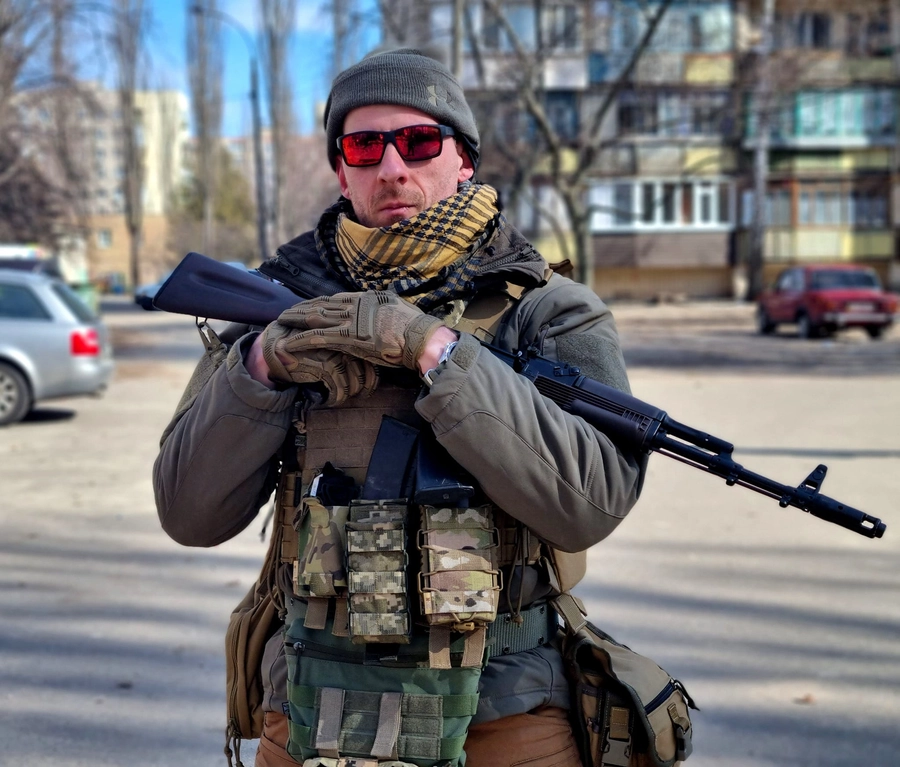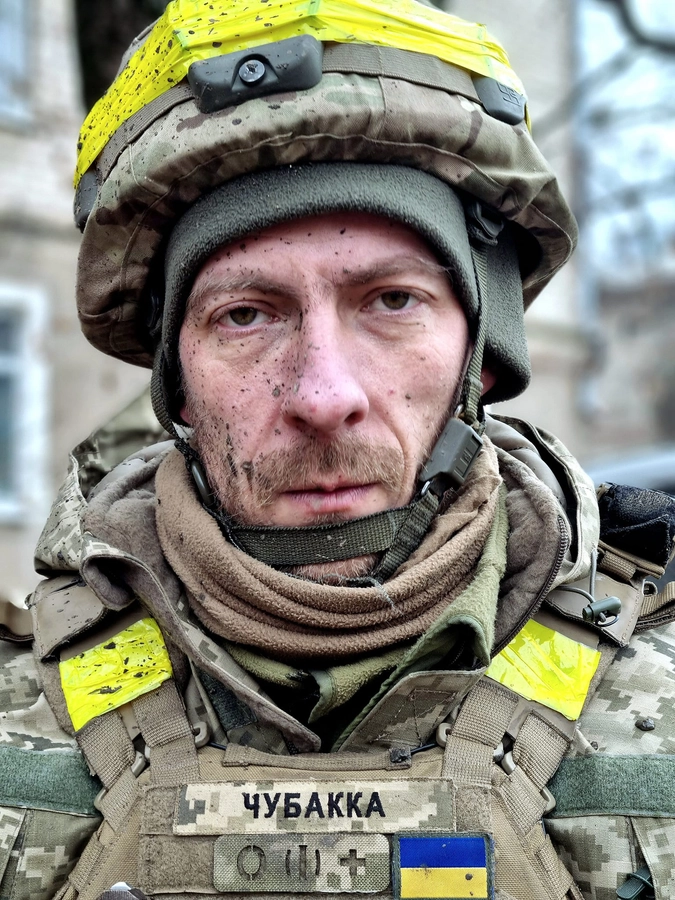With many in the general public concerned about being mobilized, Kyiv Post interviewed a soldier who volunteered two weeks before Russia’s full-scale invasion about the motives defenders have – it’s not about territory, it’s about people, he said.
We met in the center of Kyiv. More than 2 years ago, Pavlo Cheburey, a successful graduate of the Kyiv-Mohyla Academy, joined the Territorial Defense Forces. He has been serving Ukrainesince the beginning of February 2022.
JOIN US ON TELEGRAM
Follow our coverage of the war on the @Kyivpost_official.
Today, he has progressed from being a neophyte soldier to combat medic as a staff sergeant. He has taken part in combat operations near Bakhmut and in the Luhansk region.
Cheburey talked with Kyiv Post about Ukrainian Volunteer Day, about defenders’ strength of spirit, about the choice to serve, and about whether he is still strong after two years of war.
You joined the Territorial Defense Forces just a few days before the invasion. I remember you wrote that you were a “day off”soldier
Yeah. It was just two weeks before the full-scale invasion, I remember exactly that it was on Feb. 10 I took my oath. That day my feeling was, most likely, that [the Russians] would not dare to go to Kyiv.

Worldwide Marches Planned This Weekend Condemning 3rd Anniversary of Russia’s Full-Scale Invasion of Ukraine
I was absolutely sure that there would be a serious escalation in Donbas, but not more.
Tell me about your motivation
Everyone has their own motivation. There are volunteers who went to fight in 2014 and went to Donbas, where they had never been before and did not even really know where it was.
Nevertheless, they felt that it is Ukraine, and they were ready to fight. And you know, I didn’t go then. That is, I am one of those volunteers who joined when they felt that tomorrow the enemy could be in Kyiv, that Russian soldiers could walk around Kontraktova Square, where I studied. That they would do what they actually do everywhere.
Photo: social media
You didn't want to see Russians in Kyiv.
Because I understand what the Russian army is. Rapes, murders, destruction, war crimes.
They did all of these in Chechnya, they did all these in Syria. They did the same in Georgia. They always fight exactly the same way. Russia always does this.
And I understood that being a civilian in such a case means to completely surrender yourself to the mercy of such demi-humans. It doesn't suit me. And the worst thing is not that you could be killed. The problem is that they can kill your loved ones or friends, the girls you were with, those people who are more important to you than yourself.
And how to live with it, if your loved ones are raped and killed, and you can’t do anything about it?
Most of the combat operations you took part in - what were they like?
Mostly defensive. There were combat fights at certain places.Some people took part in the battle of Bakhmut, because the battles themselves, even on the front line, do not happen as oftenas you may imagine.
People imagine war in such a way that you necessarily shoot with a machine gun, and they shoot at you. That’s a stereotype.
Most of the time there was no contact with the enemy. We werejust standing there, shelled by mortars and artillery. But the point is that you are standing, you are holding your position at thatmoment.
While we hold it, the Russians are not there. It’s that simple. Their task is to make sure that we leave there, preferably on our own, so they don’t need have to knock us out by storming [our position].
Photo: social media
Two years ago, we could see long queues for military service. Now people are resisting mobilization. Do you feel angry about this or disappointed? Would you have volunteered then if you knew what would happen now?
If I knew that they wouldn't enter Kyiv, I don't know how I would have acted, maybe I wouldn't have gone to the Teroborona[Territorial Defense Forces], but we never know in advance. We cannot know in advance how it will be.
We see that the Russians did not succeed in attacking Kyiv, or maybe they did not succeed because all of us, I mean, because there were queues for the military and people went and were ready to fight. That is why we are not fighting back somewhere in the Carpathians, for example. We are not building positions near Vinnytsia. Perhaps this is why Khreshchatyk [Ave.] does not look like Bakhmut.
Many people still do not understand that the appetites of Russians are impossible to satisfy. They would go as far as they could, as far as the Ukrainian army retreated.
There would be ruins everywhere.
Do you feel demotivated by people who say that it is your job to protect them – it’s your choice, it’s your problem, your business – and they will not join the army?
I am not fighting for all of them. I have an exhaustive list of people for whom I joined army. The people I am protecting.
I did not go to defend “everyone,” and not just me. Every soldier has such a list. For somebody it’s a family, some have friends, some have relatives, acquaintances… We protect Ukraine in each of them.
Ukraine is not only about borders. Ukraine has names, faces, places, memories... I fight for very specific people that I regularly see in person. Sometimes I cannot see in person somebody for months, just see that they are alive and well by the green mark on Facebook.
This is my Ukraine, what I am fighting for.
What is your attitude toward mobilization and the fact that many do not want to join the military?
Today a professional army will never win a global conflict by itself. Its task is to make time to carry out a general mobilization. To use all mobilization reserves. A professional army should last for 3-5 months. That’s it. It’s true not only about Ukraine, but this is also usual for every army in every country.
Some people say that this war is not for them, they are not interested.
Just because the war is far away, and he or she cannot see it from the window of their house? The problem is that if the Ukrainian military falls and the front collapses, it would be a matter of two days to encircle Kyiv. No one would escape anywhere.
The choice is between serving in the Ukrainian military or being under occupation with all the consequences of it.
There are just a few options: you could die after shelling, the occupants could simply shoot you, or they could mobilize you fortheir army, as happened in Donetsk. And they would no longer hear conversations about “I don't want…,” “open the borders,” etc.
What will you do after the war? Will you stay in the army?
My friend Sam and I talked about it all the time, we planned to quit smoking as soon as the war is over... We imagined how we would leave the rifles, sit on a bench somewhere near the unit, smoke a couple of cigarettes each, and then throw the half-empty packs into the trash bin...
Sam stopped smoking 3 days before he died... Sergeant Chebureywill retire only when the threat has passed. And if they offered me to demobilize now, I’m not sure. I am fed up by this war, but as long as the threat has not passed, I cannot leave this.
You can also highlight the text and press Ctrl + Enter













